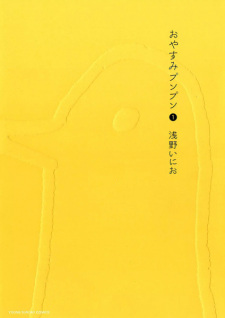Alternative TitlesJapanese: おやすみプンプン More titlesInformationType: Manga
Volumes: 13
Chapters: 147
Status: Finished
Published: Mar 15, 2007 to Nov 2, 2013
Theme:
Psychological
Demographic:
Seinen
Serialization:
Big Comic Spirits Authors:
Asano, Inio (Story & Art) Statistics Ranked: #142 2 based on the top manga page. Please note that 'R18+' titles are excluded. Popularity: #8
Members: 484,055
Favorites: 55,728 Resources | Recommendations
|































































































